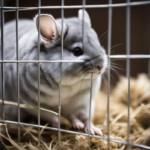Caring for a chinchilla is a unique and rewarding experience. These small, fluffy creatures require specific care to ensure their well-being and happiness.
In this guide, we’ll delve into the intricacies of How To Care For A Chinchilla, covering everything from their diet to creating an enriching environment for these charming rodents.

What makes chinchillas unique?
Chinchillas are crepuscular, meaning they are most active during dawn and dusk. Their thick fur, which is softer than a cloud, is adapted to the high-altitude regions of the Andes Mountains in South America.
How To Care For A Chinchilla – A Brief Overview

Chinchilla care involves a delicate balance of diet, hygiene, and mental stimulation. Let’s explore each aspect in detail.
Cage Selection
Choosing the right cage is the first step in creating a comfortable home for your chinchilla. Opt for a multi-level cage with horizontal bars for climbing.
Location Matters
Place the cage in a quiet, cool area away from direct sunlight. Chinchillas are sensitive to heat, so maintaining a moderate temperature is essential.
Bedding Bliss
Provide soft bedding, such as aspen shavings or fleece liners, to keep your chinchilla cozy. Regularly clean and replace bedding to ensure cleanliness.
A Chinchilla’s Diet

Understanding what to feed your chinchilla is crucial for its overall health. Let’s explore the dietary needs of these adorable creatures:
Hay All the Way
Hay is a staple in a chinchilla’s diet. Ensure a constant supply of high-quality hay, such as timothy hay, to promote dental health and proper digestion.
Pellets for Balance
Include high-fiber pellets in your chinchilla’s diet. Look for options specifically formulated for chinchillas and avoid those with added sugars.
Fresh and Fruity Treats
While chinchillas don’t need many treats, occasional fresh fruits like apples and pears can be offered in small quantities.
Health Matters

Maintaining your chinchilla’s health is a top priority. Regular check-ups and a watchful eye can make a significant difference:
Regular Vet Visits
Schedule regular vet visits to ensure your chinchilla is healthy. Find a vet experienced in exotic pet care for the best results.
Dental Care
Chinchillas’ teeth grow continuously, so provide wooden chew toys to prevent overgrowth. If you notice any dental issues, consult your vet promptly.
Bathing Basics
Chinchillas love dust baths. Provide a dust bath a few times a week to help them maintain their soft fur and clean themselves naturally.
Entertainment Extravaganza: Keeping Your Chinchilla Happy

Chinchillas are active and curious creatures. Providing mental and physical stimulation is essential for their well-being:
Toy Variety
Offer a variety of toys to keep your chinchilla entertained. From chew toys to tunnels, the options are endless.
Playtime Interaction
Spend quality playtime with your chinchilla outside the cage. Chinchillas enjoy interaction and socializing with their owners.
Environmental Enrichment
Rotate toys and rearrange the cage regularly to stimulate your chinchilla’s mind. This prevents boredom and promotes a healthy, happy pet.
Conclusion
In conclusion, knowing “How To Care For A Chinchilla” involves providing the right habitat, a balanced diet, regular veterinary care, and plenty of entertainment. By understanding and fulfilling these needs, you’ll ensure a happy and healthy life for your furry friend.
So, embark on this chinchilla care journey with confidence, and enjoy the delightful companionship these charming creatures bring to your life.
How To Care For A Chinchilla: FAQs

Can Chinchillas Eat Fruits?
Yes, in moderation. Chinchillas can enjoy small amounts of fruits like apples or pears as treats, but too much sugar can be harmful.
How Often Should I Clean the Cage?
Clean the cage thoroughly once a week, replacing bedding and sanitizing toys. Spot clean daily to maintain a hygienic environment.
Do Chinchillas Need Vaccinations?
No, chinchillas don’t require vaccinations. However, regular veterinary check-ups are crucial for overall health monitoring.
Are Chinchillas Nocturnal?
Chinchillas are crepuscular, meaning they are most active during dawn and dusk. Adjust your interaction and playtime accordingly.
Can Chinchillas Be Trained?
Yes, chinchillas can be trained to some extent. Use positive reinforcement and patience for activities like coming when called or using a litter box.
Can Chinchillas Live Alone?
Yes, chinchillas can live alone, but they thrive with companionship. Consider getting a same-sex pair to prevent loneliness.
What’s the Ideal Temperature for Chinchillas?
Chinchillas prefer temperatures between 60-70°F (15-21°C). Avoid exposing them to temperatures above 75°F (24°C).
What Do Chinchillas Need for Exercise?
Chinchillas need daily exercise. Provide a safe, chinchilla-proof space for them to explore outside the cage.











1 thought on “How To Care For A Chinchilla”